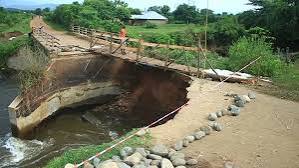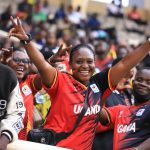Sarah’s boots sank into the muddy banks of the Manafwa River, the only sound the hum of crickets and the faint rush of water. It was past midnight in Mbale, and the town slept, but her flashlight flickered over the bridge’s cracked pillars. As a junior engineer with the district, Sarah had been assigned to inspect the new bridge—a lifeline meant to connect farmers to markets. But the invoices she’d snuck from the contractor’s office told a darker truth: cement bags half-filled, steel rods thinner than promised, funds siphoned into someone’s pocket. “This is blood money,” she muttered, snapping photos with her phone. Each crack was a wound, each rusted rod a lie. She thought of her brother, James, who crossed this bridge daily, his cart heavy with matoke.
At dawn, Sarah marched to Mr. Okwiri’s office, the contractor whose name was whispered with fear and awe in Mbale. His office smelled of polished wood and money, a stark contrast to the dusty construction site. “The bridge is a death trap,” she said, her voice steady despite trembling hands. “Fix it, or I report you.”Okwiri leaned back, his gold watch glinting. “Sarah, you’re young. Ambitious.” He slid an envelope across the desk, thick with shillings. “Take this. Keep quiet, and we all win.” His smirk dared her to join Mbale’s silent pact of corruption.Sarah shoved the envelope back, her brother’s laughter echoing in her mind—James, who called her “Engineer Sis” and believed she could fix anything. “I’m not for sale,” she said, storming out. As she walked, she opened X on her phone, typing: *“@MbaleVoice: Cracks in the new Manafwa bridge. Someone’s stealing our safety. Who’s with me? #FixOurBridges”* (120 likes, 30 retweets). Comments poured in—@Farmer256: “My cart crosses that bridge! What’s happening?”—fueling her resolve.Days later, the market’s hum was shattered by screams. Sarah was at her desk when her phone buzzed with a call: “The bridge collapsed!” Her heart dropped. She ran, dodging boda bodas, lungs burning. At the river, chaos reigned—carts overturned, people shouting, dust choking the air. The bridge lay in chunks, its center a gaping wound. Sarah’s eyes scanned the crowd, panic rising.
“James!” she screamed, spotting his green cap under debris.She clawed at the rubble, nails bleeding, until rescuers freed James, his leg broken but alive. “You’re okay,” she whispered, holding him, tears mixing with dust. Her phone buzzed with X notifications: *“@UgandaYouth: Bridge down in Mbale! People hurt. Who’s to blame? #NoMoreBribes”* (85 likes, 15 retweets). The post spread, amplifying the tragedy. Rage replaced Sarah’s relief. This wasn’t an accident. It was greed.That night, Sarah made a choice. She slipped her photos—cracks, invoices, proof—to Radio Simba, Mbale’s loudest voice. “This is Sarah Okello,” she told the journalist. “The bridge fell because of corruption. Name Mr. Okwiri and the district engineer, Mr. Wanyama.” Her voice shook, but she pressed on. “People almost died. My brother almost died.” She posted again: *“@MbaleVoice: Proof of corruption in Manafwa bridge. Okwiri and Wanyama must answer. #MbaleRising”* (150 likes, 40 retweets). Responses flooded in—@TruthTellerUG: “Expose them, Sarah! We’re with you!”—pushing her forward.By morning, Mbale was ablaze. Radio Simba’s broadcast named names, sparking fury. Farmers, traders, and students gathered at the market square, their placards bold: “No More Bribes!” and “Fix Our Bridges!” Sarah hesitated, her job on the line, but James, hobbling on crutches, nodded. “Go, Sis. Fight.” She joined the march, leading the chant: “This bridge was our lifeline! They stole it for profit!” Her phone buzzed with a viral post: *“@UgandaCares: Mbale’s marching! Corruption kills. Support Sarah’s fight! #NoMoreCorruption”* (200 likes, 50 retweets). The crowd swelled, their voices shaking the district office’s glass doors.Inside, Mr. Wanyama faced them, his face pale. “We’ll investigate,” he stammered, but the crowd roared, “No more lies!” Sarah stepped forward, her photos projected on a borrowed screen. “This is the truth,” she said, pointing to the evidence. “Half the budget went to pockets, not pillars. You built death, not progress.” The crowd cheered, and X lit up: *“@MbalePride: Sarah’s showing the receipts! End this corruption now! #BuildRight”* (180 likes, 45 retweets). But Sarah felt no victory. James’s pain, the market’s loss, weighed heavy.Days later, Okwiri was arrested, his office raided. Wanyama resigned, and the district promised a new bridge—properly built. Sarah watched workers clear the rubble, James at her side. “You did it, Engineer Sis,” he said, his smile weak but proud. She nodded, but the weight of Uganda’s broken systems lingered. Her phone buzzed with a final X post: *“@MbaleVoice: New bridge promised, but we’re watching. No more stolen futures. #MbaleRising”* (250 likes, 60 retweets). Comments like @Cynic256’s—“Nice win, but corruption’s in Uganda’s DNA”—stung, but others, like @Farmer256’s—“Thanks, Sarah. My cart’s safe now”—gave hope.In the evenings, Sarah sat by the Manafwa, its waters reflecting Mbale’s stars. She thought of her father, a farmer who’d taught her to build, not break. “Truth is heavy,” he’d said, “but it holds.” She’d carried that truth, amplified by X’s voices, and though it cost her friends and maybe her job, it saved her brother—and maybe more. The river flowed on, and so would she.
This post was created with our nice and easy submission form. Create your post!





